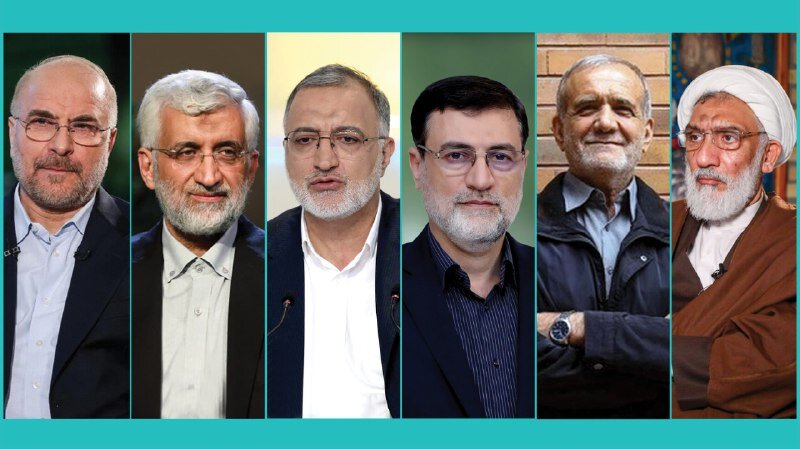Presidential candidates begin race to rally support

TEHRAN - The anticipation and anxiety surrounding Iran's 2024 presidential election dissipated on Monday as approved candidates swiftly established their campaign offices and embarked on meetings with influential figures to garner support.
Six figures were approved to run for president: Mohammad Baqer Qalibaf, Saeed Jalili, Alireza Zakani, Amir-Hossein Ghazizadeh Hashemi, Masoud Pezeshkian, and Mostafa Poumohammadi, who have already begun to receive help from some of the fellow 74 politicians that could not gain the approval of Iran’s Guardian Council.
Three of the hopefuls appeared on national TV on Monday to speak to the people of Iran regarding their plans and visions for the country’s future.
Mohammad Bagher Qalibaf, widely considered a leading contender in Iran's 2024 presidential election, made his first campaign appearance on Iran’s News Channel. During his 45-minute address, Qalibaf prioritized economic issues and financial well-being.
"Throughout my career, I have consistently leveraged technology and engaged young experts to enhance efficiency," Qalibaf stated. "Maximizing effectiveness is paramount to me."
Qalibaf's economic platform is expected to be a central theme of his campaign as he seeks to address the challenges facing Iran's economy. “The motto is ‘Service and Progress’. Of course, this is not just a motto, it is a reality that we must pursue and achieve,” he said.
Qalibaf’s biggest perceived opponent, Pezeshkian, also appeared on the same channel to outline his campaign platform and priorities. Pezeshkian’s remarks were highly reminiscent of Iran’s past reformist candidates, who have led the country for a period of 24 years since the victory of the Islamic Revolution.
Pezeshkian courts reformists with Zarif appointment pledge
The 70-year-old physician has reportedly pledged to reappoint former Iranian Foreign Minister Mohammad Javad Zarif if elected. This move is seen as an attempt to garner support from reformist and moderate voters, among whom Zarif enjoys high levels of popularity.
Reformists have faced declining popularity since the collapse of the Joint Comprehensive Plan of Action (JCPOA), which was negotiated under Zarif's leadership. The JCPOA's demise led to the re-imposition of U.S. sanctions and significant economic hardship in Iran. The inking of new “JCPOAs” was a key campaign promise for former President Hassan Rouhani, who secured a second term largely based on the nuclear deal’s appeal.
Joining other presidential candidates on Monday, Qazizadeh Hashemi also took to national television to present his campaign platform and priorities. Qazizadeh was allotted 30 minutes to discuss his agenda with viewers.
5 presidential debates are scheduled to take place in the coming days. Candidates are allowed to campaign until June 26, two days before Iranians are set to show up at the ballot box to cast their votes.
